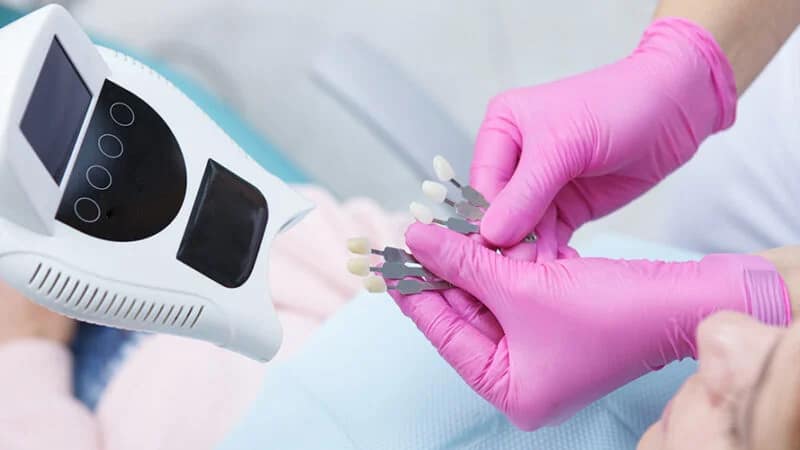Teeth Veneers Types
Teeth veneers are selected according to their purposes, materials used and also according to the situation. Let us have a look at the different teeth veneers types available:
Temporary Veneers – These are used for a limited period until the permanent ones are made. The quality and the size of these veneers are made sure to adhere to the standards of the permanent ones. The temporary ones are thicker and also can be less smooth than the tooth enamel.
No-Prep Veneers – These veneers do not require any preparation before placing on the tooth. The tooth structure is preserved well in these veneers since the filing and grinding of enamel are not done in this. They are removable without causing any damage to the natural tooth and they are known to last for 5-7 years. They are not expensive in comparison to other veneer types but are the risk of breaking.
Composite Resin Veneers – These are available at affordable prices and are beneficial in covering discolored or misshaped teeth. The composite material used in this method is directly applied to the tooth and is shaped during the same procedure making it the veneer that can be fixed in just one dental visit.
Porcelain/Ceramic Veneers – These are the standard veneers used in the treatment and are very durable and are known to have good composition to act as stain resistant also. The drawback seen in this veneer is more enamel is filed from the natural tooth to make these veneers fit perfectly on the tooth.
Why Are Porcelain Veneers So Popular?
Versatility – They provide a perfect smile by concealing multiple flaws of the teeth such as discoloration, cracked and even broken teeth. The gap in the front tooth can also be masked with porcelain veneers.
Need-Based Customization – Since the veneers are customized perfectly to fit each individual’s needs, they look very natural and enhance the overall appearance of the person.
Easy Placement – Veneers procedure is typically completed in just two dental visits. The dental impressions are taken in the first visit and the temporary veneers are placed to protect the teeth structure. The second visit comprises of removal of temporary veneers and the placing of permanent ones.
Strength and Durability – The veneers last for a longer duration when good oral hygiene habits are practised also it’s important to avoid any activities that can cause damage to veneers such as opening bottles and packages with the teeth, breaking the ice and biting shells with the teeth.
Cost of Teeth Veneers
The cost of the veneers depends on the material chosen, the number of teeth, the veneer brand and also the geographical location of the dental office. The average cost of veneer may vary from $250-$2500 per tooth.
Composite Veneers – They cost anywhere between $200-$1500.
Porcelain Veneers – This variety of single veneers will cost $600-$2500.
No-Prep Veneers – These veneers cost range between $800-$2000 per veneer.
Post-Op Instructions for Veneers
Post-op instructions for the veneer treatment are the same for any kind of veneer chosen.
Immediate Post-Op Care
There would be numbness for the initial 2-3 hours post-treatment if there is inducing local anesthesia. It is better not to eat anything until the effect of anesthesia erases away completely. But if you still want to eat anything then opt for soft foods that don’t require chewing like mashed potatoes, pudding and yoghurt.
There can be temporary irritation or soreness in the injected tooth area but it will wear off in a few hours. The dentist would suggest painkillers and salt water rinse to bring down the soreness.
The biting or sucking of lips and cheeks is to be avoided very consciously to avoid any kind of damage to the soft tissues in the mouth area.
How to Manage Tooth Sensitivity Post Procedure?
The veneer teeth can experience hypersensitivity since a layer of enamel is scraped for veneer bonding. This factor will naturally fade away in a few days and to avoid discomfort from it can use the sensitive toothpaste before the appointment and continue it for a duration of a few more weeks post-treatment too.
How to Treat Your Teeth with Veneers?
Avoid biting your nails, holding things in your mouth, or opening bottles and packages with veneers.
Do not eat hard and sticky foods such as candies and crunchy foods. Dark foods such as different colored sauces are to be avoided since they cause staining on teeth. Other dark-colored foods such as wine, coffee and tea and acidic content foods are also to be avoided to keep away the stain formation on veneers.
Veneers are indeed strong and durable but when excessive pressure is applied to them they tend to break or dislodge and under such circumstances they have to be entirely replaced.
Brushing and Flossing with Veneers
It is suggested not to brush too forcefully along the gumlines since it may cause receding of the gums. An electric brush with soft bristles is best for teeth with veneers. The usage of non-abrasive toothpaste with fluoride content in it is beneficial. Brushing twice a day helps evade bacterial and plaque formation.
Flossing is also necessary to avoid periodontal infections in the teeth area.
Usage of Nightguard
There are chances of teeth grinding and clenching in sleep that may affect the veneers. Since this happens in sleep you might not be aware of it and gradually there is wear and tear of veneers leading to replacement. So dentists recommend the usage of a nightguard that protects the teeth and veneers from bruxism.
Along with all the above instructions make sure to consult your dentist for regular checks on teeth veneers since regular professional clean up is equally important to keep periodontal diseases at bay.



